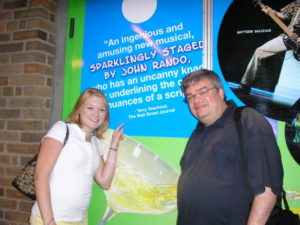 I recently reread a novel, Jon Hassler’s North of Hope, whose protagonist, Frank Healy, is a fortysomething priest without family ties. His mother died when he was twelve, after which his father permanently withdrew into himself. He has two older brothers, but they moved away as soon as they graduated from high school. They almost never see one another, even at Christmas, and correspond rarely if at all.
I recently reread a novel, Jon Hassler’s North of Hope, whose protagonist, Frank Healy, is a fortysomething priest without family ties. His mother died when he was twelve, after which his father permanently withdrew into himself. He has two older brothers, but they moved away as soon as they graduated from high school. They almost never see one another, even at Christmas, and correspond rarely if at all.
I know plenty of people in similar situations, and have no trouble understanding how they got that way. Aside from the fact that America is a big and busy country, many parents and siblings don’t get along and prefer to see as little of one another as possible. Still, there seems to me to be something profoundly sad about Father Healy’s situation, if only because my life is and has always been as different from his as it could possibly be. Even though I left Smalltown, U.S.A., shortly after graduating from high school in 1974, my family ties remained strong. I came home to visit my mother two or three times each year until she died in 2012. (My father had predeceased her by fourteen years.) In her old age, I made a point of talking to her on the phone most nights, no matter where I was.
As for David, my brother, he’s never lived anywhere but Smalltown, and though it’s been a year and a half since I last went there to see David and Kathy, my sister-in-law, I check in on them regularly by phone and e-mail and on Facebook. What’s more, they always make a special point of traveling to my opening nights, which pleases me more than I can possibly say.
 I’m also close to Lauren, my niece, who lives with her husband in Houston but comes to my openings whenever she can, which is usually. As it happens, she was in New York on business last week, so I took her to dinner and a show. We spent the whole meal chatting away like a couple of happy magpies. Considering the amount of talking we did, I’m surprised we got anything eaten—though we both cleaned our plates.
I’m also close to Lauren, my niece, who lives with her husband in Houston but comes to my openings whenever she can, which is usually. As it happens, she was in New York on business last week, so I took her to dinner and a show. We spent the whole meal chatting away like a couple of happy magpies. Considering the amount of talking we did, I’m surprised we got anything eaten—though we both cleaned our plates.
I wonder how common my experience is. I’m not sure that such things are measurable, but it wouldn’t surprise me if it’s fairly unusual. I remember how struck I was as a child by Laura Ingalls Wilder’s books, in which it was portrayed as perfectly normal for a nineteenth-century family to pull up stakes and move halfway across the country at a time when it took a month or more for a letter sent from New York to reach San Francisco. That’s what Huckleberry Finn was talking about when he spoke of how he planned “to light out for the Territory” in order to escape the “sivilizing” influence of his Aunt Sally. In Huck’s day, people who lit out for the territory didn’t go back to visit the folks on Thanksgiving. It would make perfect sense were that experience to have embedded itself so deeply in the American national character that it is even now a part of our collective psyche.
Maybe it is—and maybe it isn’t. As of 2008, four out of ten Americans still live in the community where they were born. According to a Pew Social & Demographic Trends survey:
In the Midwest, nearly half of adult residents say they have spent their entire lives in their hometown. That compares with fewer than a third of those who live in Western states. Cities, suburbs and small towns have more movers than stayers, while rural areas are more evenly split. Three-quarters of college graduates have moved at least once, compared with just over half of Americans with no more than a high school diploma. College graduates also move longer distances—and move more often — than Americans with a high school diploma or less, and employment plays a greater role in their decisions about where to live. By income group, the most affluent Americans are the most likely to have moved….
Home means different things to different people. Among U.S.-born adults who have lived in more than one community, nearly four-in-ten (38%) say the place they consider home isn’t where they’re living now. But there’s a wide range of definitions of “home” among Americans who have lived in at least one place besides their original hometown: 26% say it’s where they were born or raised; 22% say it’s where they live now; 18% say it’s where they have lived the longest; 15% say it’s where their family comes from; and 4% say it’s where they went to high school.
 I mentioned in this space the other day that I’d been feeling homesick, though I also acknowledged in the same breath that my roots have grown loose in the ground. Smalltown has changed greatly in the forty-two years since I packed my bags and moved to the city, and so have I. What’s more, I’m told—and have said myself, I think quite presciently—that America’s urban-rural split has grown deeper than ever. That being the case, it would stand to reason that I should be feeling increasingly distant from the place where I come from.
I mentioned in this space the other day that I’d been feeling homesick, though I also acknowledged in the same breath that my roots have grown loose in the ground. Smalltown has changed greatly in the forty-two years since I packed my bags and moved to the city, and so have I. What’s more, I’m told—and have said myself, I think quite presciently—that America’s urban-rural split has grown deeper than ever. That being the case, it would stand to reason that I should be feeling increasingly distant from the place where I come from.
But I don’t, not at all, not from the place and not from the people, and least of all from my beloved family. No, there aren’t as many of them as there used to be and I don’t see them nearly as often as I used to, but I love them no less and miss them even more, and I am grateful for them all. Everywhere I go, there they are.
So thanks, Lauren, for spending an evening on Broadway with your Uncle Terry. I hope you liked the show, but I’m mainly glad that you wanted to say hello. You are dear to me, as dear as Smalltown, and you will remain so to the end of time.
* * *
Travis Cross and the Santa Monica High School Wind Ensemble play Aaron Copland’s Letter from Home in 2016:


